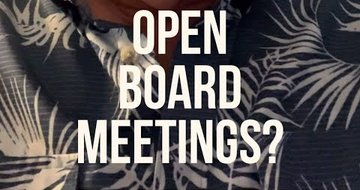The leadership habits you developed in the era of virtual meetings can be transformed into powerful leadership skills.
Leaders and organizations develop patterns—habits in terms of our "posture" and how we move and get things done. The concept of leadership alignment plays a huge role here. The challenge is that we don't always recognize it.
Leadership may require going beyond normal performance levels, up to "11," in certain situations such as facing extraordinary challenges, breaking a cycle of routine, or seizing opportunities. Effective leaders know when to push their team to their highest potential.
Celebrate actions, not just numbers. Reinforce values by ringing the bell for kindness, teamwork, and encouragement. Leaders shape culture by what they celebrate.
Effective meetings go for a minimal amount of time, accomplish what was outlined in the agenda, and people walk away with a clear idea of the next steps to take. Does this sound like your meetings? It can.
You can't build a great team, if you don't know who keeps coming up with all those great ideas. As a leader, you need to know who your big idea generators are.
Are some people just a waste of time? Are there people you need to cut out of your life now?
How can we avoid the sin of hiring too quickly? Let me offer a couple of ideas for both employers and employees.
In day-to-day life, you often team up with your closest friends. In a crisis, however, a team may be formed from total strangers.
While David was the individual chosen by God to lead Israel, David did not step into this role on his own.
In this "1-minute Strategy" video Bob Whitesel PhD explains why open board meetings sometime create roadblocks to effective leadership.
I've been competing all of my life. It seems like the very air we breathe pushes us toward individualism, not cooperation.
While today's virtual teams leverage new technology, the underlying principles of what makes that work haven't changed.
When you say, “I hate meetings!” your team could be receiving a message that might be damaging your culture more than you ever realized.
Leadership is about producing results, not reports. If you’ve ever encountered a leader who seemed more interested in inspecting activities than in inspiring results, you’ve encountered Clipboard Leadership.
While this is in no way an exhaustive list of leadership skills, I’m sharing eight of the most critical skills managers need to demonstrate in order to lead culture positively.
The late John Wooden was a basketball legend. He won 10 national championships, and today he is considered by most people to be the greatest basketball coach who ever lived. Coach Wooden used these thoughts to evaluate himself and improve.
The art of negotiation is a critical skill for a leader. You’re always wheeling and dealing in a good way, trying to make things better for yourself and those you lead.
When we lead from the heart, we earn influence with others through relationship rather than authority. Relational leaders realize that title and position only get you so far, but the places you can take a team with relational influence are endless.
There are many challenges that growing organizations face. But even in the happy land of having all the money and staff you could want, one persistent leadership challenge often remains: the ability to fully trust your team.






















